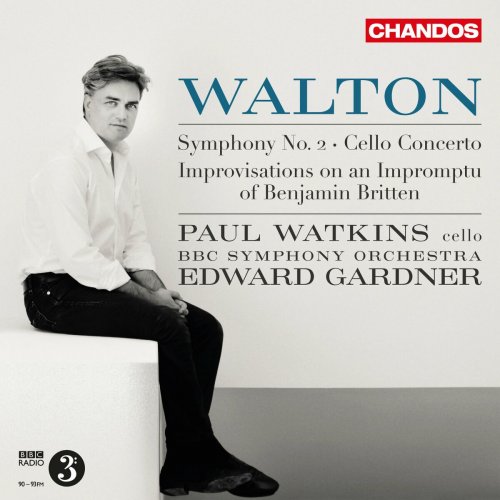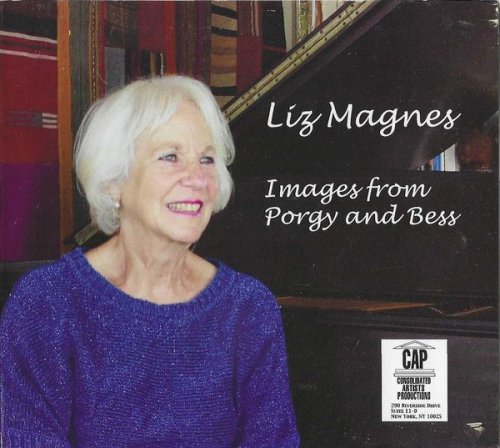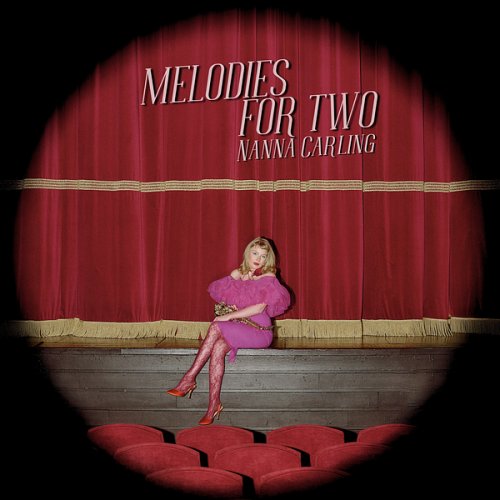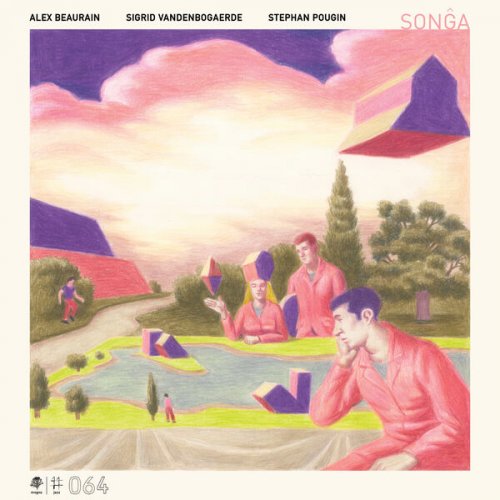Paul Watkins, BBC Symphony Orchestra & Edward Gardner - Walton: Orchestral Works, Symphony No. 2, Cello Concerto, Improvisations (2015)

Artist: Paul Watkins, BBC Symphony Orchestra, Edward Gardner
Title: Walton: Orchestral Works
Year Of Release: 2015
Label: Chandos
Genre: Classical
Quality: FLAC (tracks)
Total Time: 69:46
Total Size: 240 MB
WebSite: Album Preview
Tracklist:Title: Walton: Orchestral Works
Year Of Release: 2015
Label: Chandos
Genre: Classical
Quality: FLAC (tracks)
Total Time: 69:46
Total Size: 240 MB
WebSite: Album Preview
1. Improvisations on an Impromptu of Benjamin Britten: Theme. Lento - Improvisation I (3:54)
2. Improvisations on an Impromptu of Benjamin Britten: Improvisations I & II (2:40)
3. Improvisations on an Impromptu of Benjamin Britten: Improvisation III (3:54)
4. Improvisations on an Impromptu of Benjamin Britten: Improvisation IV (3:17)
5. Cello Concerto: I. Moderato (8:00)
6. Cello Concerto: II. Allegro appassionato (6:08)
7. Cello Concerto: III. Lento (4:14)
8. Cello Concerto: III. Risoluto, tempo giusto (2:49)
9. Cello Concerto: IV. Rapsodicamente (6:45)
10. Symphony No. 2: I. Allegro molto (8:36)
11. Symphony No. 2: II. Lento assai (10:12)
12. Symphony No. 2: III. Finale. Theme and Variations (5:39)
13. Symphony No. 2: III. Finale. Fugato (3:42)
Product Description
Edward Gardner conducts the BBC Symphony Orchestra in late music by Walton. It follows the success of his recording of Walton's Symphony No. 1 and Violin Concerto one of Chandos' best-selling recordings for 2014. With an air of relaxation that differs from the tension of his previously recorded early works, the music on this album is likely to cause as much excitement.
Walton's Second (and last) Symphony was commissioned for the 750th anniversary, in 1957 58, of the founding of the city of Liverpool, but, delayed by the composition of the Cello Concerto, it was only premiered in 1960. Scored for a large and colourful orchestra, it is based on the same model as the Third Symphony of Albert Roussel, with a similarly compact duration and the use of the key of G minor, and a concentration on angular melodies, sharply dissonant harmonies, and motoric rhythms.
The Cello Concerto was premiered in London in 1957 by the BBC Symphony Orchestra itself. The cello soloist is Paul Watkins, exclusive on Chandos, highly praised as a member of the Emerson String Quartet, but also the Artistic Director, since last year, of the Great Lakes Chamber Music Festival of Detroit. In this piece, the traditional structure of Walton's earlier concertos a moderately paced opening movement followed by a central scherzo ends in a rich finale consisting of a theme and four 'improvisations'. The concept of 'improvisation' occurs again in the last work on the disc, based on the 'Impromptu' of Benjamin Britten's Piano Concerto.
Review
There is nothing egotistical in these splendid interpretations, and the result is a set of consistently satisfying performances of the highest musical grasp and understanding. I cannot imagine anything finer than these. IRR OUTSTANDING --IRR,Mar'15
Walton and Britten weren't close friends. The older composer resented the younger upstart's rapid rise, but the pair maintained a courteous professional relationship. Britten commissioned Walton's opera The Bear for Aldeburgh, and Walton asked Britten for permission to use the third movement of his Piano Concerto as the basis of his Improvisations, written for the San Francisco Symphony in the late 1960s. Edward Gardner's new recording of this attractive, clever work is a corker. The brief Moderato third section is so exquisite that it's worth the cost of the whole CD; Walton's ticking woodwinds accompanying a splintered, slinky version of Britten's theme. There's a brief, passionate eruption which Gardner wisely milks to the hilt. The work's close is in Walton's brittle late style, the stabs of brass underlined with bright percussion. It's a bracing amuse-bouche for Walton's rather lovely Cello Concerto, which I'm convinced is the best of his three string concertos. Soloist Paul Watkins impresses in the quicksilver scherzo, and compels in the last movement's ruminative cadenzas. And how good to hear the BBC Symphony Orchestra on such outstanding form; the concerto's slow, contemplative fade is delicious. Gardner achieves similar miracles with Walton's still undervalued Symphony no 2. The BBC brass excel; muted trombones near the end of the first movement really snarl, and a terrifying horn solo in the Finale is flawless. This is such an entertaining work the tunes are good, the orchestration is dazzling and it says all it has to say in less than 30 minutes. Gardner's deft, spiky reading is a winner, from the Stravinskian opening flourish to a last movement which never sprawls. The coda's fireworks are magnificent, and you can actually hear the single tubular bell note. Chandos's widescreen sound is what the piece deserves you'll hear things in this recording that you've never heard before. Listen to it at high volume when everyone's gone out. --ArtsDesk, 21/3/15
Edward Gardner directs superbly perceptive account of Walton's Second Symphony, exhilarating in its purposeful thrust but never flinching from this music's formidable nervous energy and edgy, at times desperate undertow.fill-blooded, expansiove and judiciously balanced SACD sound; a gem of a disc. GRAMOPHONE EDITORS CHOICE. --Gramophone,May'15
Edward Gardner conducts the BBC Symphony Orchestra in late music by Walton. It follows the success of his recording of Walton's Symphony No. 1 and Violin Concerto one of Chandos' best-selling recordings for 2014. With an air of relaxation that differs from the tension of his previously recorded early works, the music on this album is likely to cause as much excitement.
Walton's Second (and last) Symphony was commissioned for the 750th anniversary, in 1957 58, of the founding of the city of Liverpool, but, delayed by the composition of the Cello Concerto, it was only premiered in 1960. Scored for a large and colourful orchestra, it is based on the same model as the Third Symphony of Albert Roussel, with a similarly compact duration and the use of the key of G minor, and a concentration on angular melodies, sharply dissonant harmonies, and motoric rhythms.
The Cello Concerto was premiered in London in 1957 by the BBC Symphony Orchestra itself. The cello soloist is Paul Watkins, exclusive on Chandos, highly praised as a member of the Emerson String Quartet, but also the Artistic Director, since last year, of the Great Lakes Chamber Music Festival of Detroit. In this piece, the traditional structure of Walton's earlier concertos a moderately paced opening movement followed by a central scherzo ends in a rich finale consisting of a theme and four 'improvisations'. The concept of 'improvisation' occurs again in the last work on the disc, based on the 'Impromptu' of Benjamin Britten's Piano Concerto.
Review
There is nothing egotistical in these splendid interpretations, and the result is a set of consistently satisfying performances of the highest musical grasp and understanding. I cannot imagine anything finer than these. IRR OUTSTANDING --IRR,Mar'15
Walton and Britten weren't close friends. The older composer resented the younger upstart's rapid rise, but the pair maintained a courteous professional relationship. Britten commissioned Walton's opera The Bear for Aldeburgh, and Walton asked Britten for permission to use the third movement of his Piano Concerto as the basis of his Improvisations, written for the San Francisco Symphony in the late 1960s. Edward Gardner's new recording of this attractive, clever work is a corker. The brief Moderato third section is so exquisite that it's worth the cost of the whole CD; Walton's ticking woodwinds accompanying a splintered, slinky version of Britten's theme. There's a brief, passionate eruption which Gardner wisely milks to the hilt. The work's close is in Walton's brittle late style, the stabs of brass underlined with bright percussion. It's a bracing amuse-bouche for Walton's rather lovely Cello Concerto, which I'm convinced is the best of his three string concertos. Soloist Paul Watkins impresses in the quicksilver scherzo, and compels in the last movement's ruminative cadenzas. And how good to hear the BBC Symphony Orchestra on such outstanding form; the concerto's slow, contemplative fade is delicious. Gardner achieves similar miracles with Walton's still undervalued Symphony no 2. The BBC brass excel; muted trombones near the end of the first movement really snarl, and a terrifying horn solo in the Finale is flawless. This is such an entertaining work the tunes are good, the orchestration is dazzling and it says all it has to say in less than 30 minutes. Gardner's deft, spiky reading is a winner, from the Stravinskian opening flourish to a last movement which never sprawls. The coda's fireworks are magnificent, and you can actually hear the single tubular bell note. Chandos's widescreen sound is what the piece deserves you'll hear things in this recording that you've never heard before. Listen to it at high volume when everyone's gone out. --ArtsDesk, 21/3/15
Edward Gardner directs superbly perceptive account of Walton's Second Symphony, exhilarating in its purposeful thrust but never flinching from this music's formidable nervous energy and edgy, at times desperate undertow.fill-blooded, expansiove and judiciously balanced SACD sound; a gem of a disc. GRAMOPHONE EDITORS CHOICE. --Gramophone,May'15

![Sam Dillon, Andrew Gould - Trade Off (2025) [Hi-Res] Sam Dillon, Andrew Gould - Trade Off (2025) [Hi-Res]](https://www.dibpic.com/uploads/posts/2025-12/1765497612_e7q3c9soiingb_600.jpg)
![Nābu Pēra - Soundscapes of Nicosia (2025) [Hi-Res] Nābu Pēra - Soundscapes of Nicosia (2025) [Hi-Res]](https://img.israbox.com/img/2025-12/14/lhs20jten1ip5ht0uibyjocfe.jpg)

![Chewing, Dave Harrington, Ryan Hahn, Spencer Zahn - Quintet (Live in Los Angeles) (2025) [Hi-Res] Chewing, Dave Harrington, Ryan Hahn, Spencer Zahn - Quintet (Live in Los Angeles) (2025) [Hi-Res]](https://img.israbox.com/img/2025-12/12/owakjkfg0whflv2rzyocno89p.jpg)


![Machito and His Orchestra - Irving Berlin in Latin America (Remastered Edition 2025) [Hi-Res] Machito and His Orchestra - Irving Berlin in Latin America (Remastered Edition 2025) [Hi-Res]](https://www.dibpic.com/uploads/posts/2025-12/1765784965_moib.jpg)
